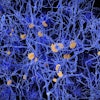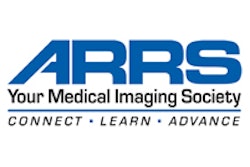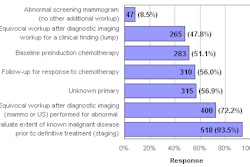While preoperative MRI in women newly diagnosed with breast cancer helped to increase detection of ipsilateral tumors and contralateral tumors, its utilization significantly lengthened the time between diagnosis and surgery.
The joint study from the Yale School of Medicine in New Haven, CT, and the University of Iceland in Reykjavík also noted that preoperative MRI results may have influenced some women to choose mastectomy as a course of treatment without tissue confirmation of additional cancer.
With the use of MRI to determine the extent of disease in newly diagnosed breast cancer patients increasing, Yale researchers sought to determine the modality's efficacy in detection, the time from the diagnosis of cancer to definitive surgery, and how MRI affected the type of therapy in diagnosed cancer patients.
Preoperative MRI patients
"At our institution, preoperative MRI is not routine for all patients diagnosed with breast cancer," said Dr. Meghna Krishnan, co-author of the study and a resident at Yale. A preoperative MRI exam is done primarily at the surgeon's discretion for reasons such as breast conservation, to determine the extent of a tumor, and in cases of women with mammographically dense breasts.
The retrospective study included 110 patients who received a preoperative MRI exam before definitive surgery between January 2005 and December 2006. "We also followed these patients to see what additional procedures MRI had prompted," Krishnan added, "whether it led to surgery, the date of definitive surgery, and histopathological reports from the procedures and the definitive surgery."
Researchers also created a control group of patients who did not have an MRI exam between the diagnosis of cancer and surgery. The control group included data taken from 374 women between 2003 and 2006, with two-thirds of the patient histories taken from 2005 to 2006. Krishnan said the control group was expanded to four years to increase the sample size.
Study results
In a comparison between the two groups, the study found that the time interval between diagnosis and definitive surgery in the preoperative MRI group was 41 days, compared with 27 days for the control group.
Regarding cancer detection among the 110 patients in the preoperative MRI group, the modality prompted biopsies in 70 sites in 44 patients (40%). "Of those 70 sites that were biopsied, 16 were pathologically proven to be cancer -- 13 ipsilateral and three contralateral," Krishnan said during her presentation at the annual meeting of the American Roentgen Ray Society (ARRS).
In addition, at least two additional biopsies were performed in 21 patients and at least three additional biopsies were done in five patients.
Treatment decisions
Preoperative MRI also changed surgical treatment in 31 cases, or 28% of the patients in the MRI group. Three patients had contralateral cancer that was detected and treated, while six patients underwent more extensive lumpectomy following the MRI.
Seven patients went for bilateral, rather than unilateral, mastectomy and 15 patients had mastectomy instead of lumpectomy. "Among the 15 patients who underwent mastectomy instead of lumpectomy," Krishnan added, "all had suspicious findings in the ipsilateral breast on MRI."
The study also noted that nine patients opted for mastectomy without tissue confirmation of multifocal disease. At pathology, it was discovered that four of those nine patients had multifocal disease.
Nine patients with bilateral abnormalities on MRI had bilateral rather than unilateral mastectomy. Two patients had tissue confirmation of contralateral malignancy prior to mastectomy, while seven patients did not. At pathology, no contralateral cancers were found in those seven cases.
By Wayne Forrest
AuntMinnie.com staff writer
July 25, 2008
Related Reading
Solid-state scintimammography matches breast MRI, July 2, 2008
When MRI won't work, MDCT can help differentiate breast lesions, study suggests, June 19, 2008
MRI useful in detecting additional breast cancer, June 13, 2008
Contrast MRI helps track breast cancer therapy response, June 6, 2008
Breast MRI with USPIO contrast helps assess lymph node metastases, April 25, 2008
Copyright © 2008 AuntMinnie.com


.fFmgij6Hin.png?auto=compress%2Cformat&fit=crop&h=100&q=70&w=100)





.fFmgij6Hin.png?auto=compress%2Cformat&fit=crop&h=167&q=70&w=250)











